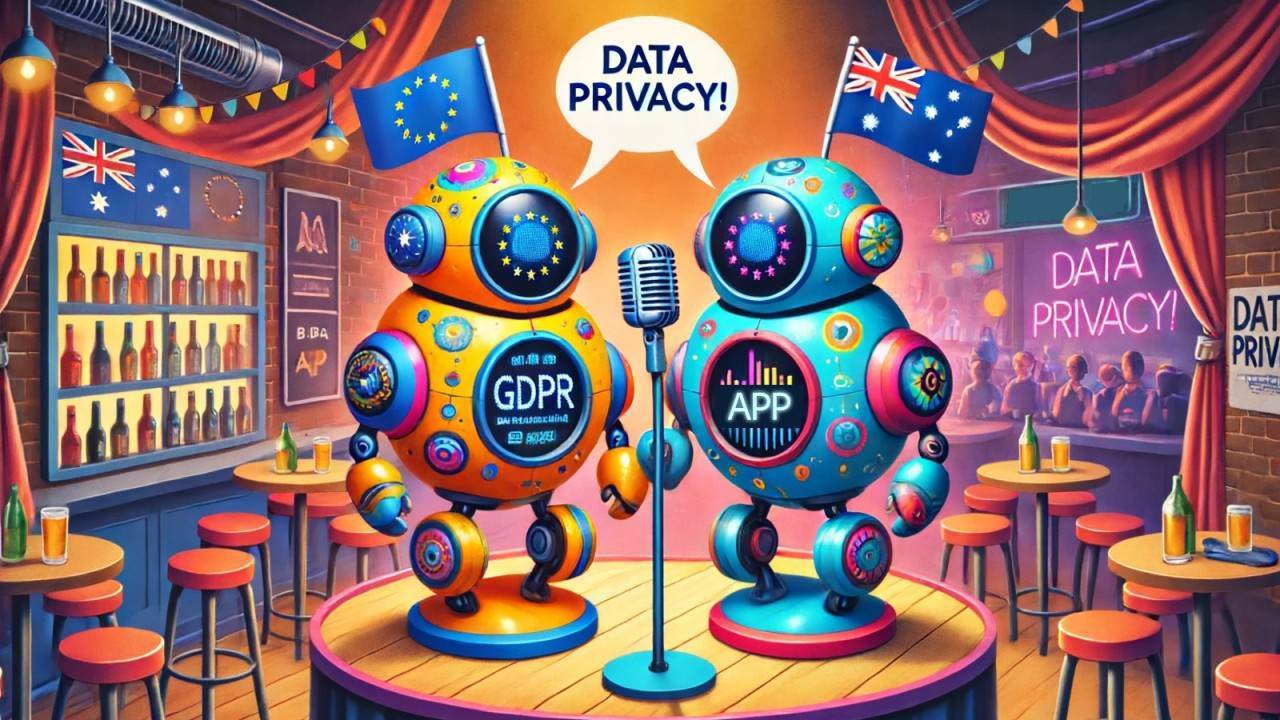A Data Privacy Duet: GDPR (European) & APP (Australian) Regulation

The Data Privacy Leader from Europe
General Data Protection Regulation (GDPR), reigning since May 2018, is the undisputed heavyweight in data protection. This regulation doesn't just flex its muscles in the EU; it punches above its weight globally, impacting any company handling EU citizens' data. It’s all about data lawfulness/fairness/transparency, purpose limitation, data minimisation, Accuracy, storage limitation, integrity and confidentiality, and finally accountability, with fines that pack a punch up to 4% of global turnover or €20 million, whichever is heftier.
Data Privacy Down Under
Australian Privacy Principles (APP), part of the Privacy Act 1988, sets the stage for data privacy in Australia, governing both private sector organisations and federal agencies. It focuses on the collection, use, and disclosure of personal information, data security, and access to personal information, ensuring everyone plays fair in the land down under.
Common Ground: Where They Shake Hands
Both GDPR and APP:
- Mandate transparency and robust security measures.
- Empower individuals with rights over their data, such as access, correction, and deletion.
Key Differences: Where They Part Ways
- Scope and Penalties: GDPR has a broader scope with more severe penalties compared to APP.
- Regulatory Provisions: GDPR requires Data Protection Officers (DPOs) and mandatory Data Protection Impact Assessments (DPIAs) for high-risk processing, which APP does not.
Intersection: Shared Goals
Both frameworks aim to protect privacy and regulate cross-border data transfers, though GDPR’s extraterritorial reach is more pronounced.
Up Next: GDPR and APP Standards Coming Your Way After June 2024
GDPR's Future Moves
- AI Act: On 21 May 2024, the European Union approved the EU Artificial Intelligence Act. This act is set to fully roll out over the next few years. High-risk AI systems will face stringent requirements, with bans on certain practices starting six months post-publication, and full compliance required within 36 months.
- DPO Investigations and Guidance: The European Data Protection Board (EDPB) is pushing for clearer guidance and more resources for Data Protection Officers to enhance their roles effectively.
- Codes of Conduct: The European Commission is encouraging the creation of EU-wide codes of conduct, especially in health and research sectors, to harmonise standards and ease compliance for SMEs.
What's Cooking in Australia with Privacy?
- Privacy Act Amendments: Following a 2023 review, Australia is set to implement significant amendments aligning more closely with GDPR principles. These updates will introduce more stringent data handling requirements and increased penalties for non-compliance, with finalisation expected throughout 2024.
- New Standards for Data Transfers: Australia plans to introduce clearer guidelines for international data transfers, ensuring personal data moved outside the country is protected in line with domestic standards, akin to GDPR’s cross-border data rules
A side note about US Data Privacy Laws
1. The most significant difference in US legislation versus the EU is the lack of a comprehensive data privacy law that applies to all types of data and all US companies (e.g. for-profit, not-for-profit, etc).
2. US legislation currently takes a more fragmented approach with various regulations governing different types of data and sectors including:
§ The Health Insurance Portability and Accountability Act (HIPAA)
§ The Gramm-Leach-Bliley Act (GLBA)
§ The Federal Information Security Management Act (FISMA)
Simplify Your Regulatory Compliance: Enter Selode.AI

Selode.AI offers a robust data privacy solution for enterprises and SMEs. This on-premise, scalable, and cost-efficient and offline AI platform meets stringent data security regulations without overburdening your organisation with admin, ensuring your data stays offline and secure. Here’s how it aligns with GDPR and APP requirements:
- Data Minimisation and Security: Processes only necessary data and ensures it is securely stored.
- Transparency and Accountability: Provides clear data handling practices and audit trails.
- User Rights: Facilitates access, correction, and deletion requests, crucial under GDPR.
- High-Risk AI Compliance: Supports mandatory impact assessments and compliance documentation for high-risk AI systems.
By leveraging Selode.AI, businesses can confidently navigate the complex landscape of data privacy laws, ensuring compliance and keeping data privacy front and centre, just as it should be.
Australian Privacy Principles from the OAIC: https://www.oaic.gov.au/privacy/australian-privacy-principles
European Data Protection Regulation from the EU:
https://gdpr-info.eu/used


